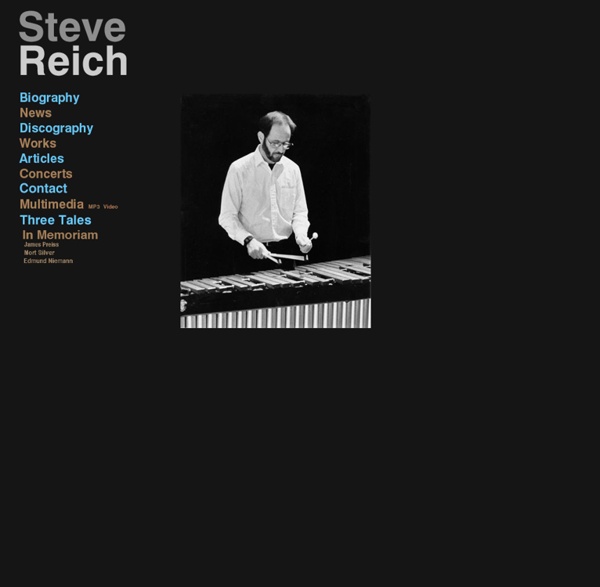



Elegy - Musique & Culture Underground Brian Siskind | Blog Steve Reich ESTWeb Main Index | ESTWeb Articles Index | References | Brief Biography of Steve Reich This article originally appeared in EST #3, and also appears in slightly different form in Roger Sutherland's book, New Perspectives in Music. by Roger Sutherland "Systems Music" is a term which has been used to describe the work of composers who concern themselves with sound continuums which evolve gradually, often over very long periods of time. The most well-known of these composers are Steve Reich, Philip Glass, and La Monte Young. The listener is invited, not to follow a complex musical "argument", but to concentrate upon a slowly changing sound and focus with microscopic awareness on different aspects of it. Systems composers appear to have worked largely outside the mainstreams of both European and American music, drawing inspiration instead from various ethnic musical forms - Ghanian and Balinese music in Reich's case, Japanese Gagaku in the case of Young. By and (C) Roger Sutherland. References
France Inter - Electron libre A guide to Steve Reich's music It's rare that one says this about a contemporary composer, but it's become too easy to take Steve Reich for granted. Of course, that's a sign of just how influential his music has been, the way it has drawn on everything from African drumming to concept art, and how it has influenced generations of pop, jazz and classical musicians over the last half-century. In fact, if you were to subtract Steve Reich from the total sum of today's musical culture, I think you'd notice more of a difference than if you took away any other single figure. Even if you think you don't know Reich's music directly, you will almost certainly be familiar with what it does, thanks to the way his music and his example have been refracted by other composers in other fields. Later, Reich found a way of using tonal and modal chords but unmooring them from any conventional harmonic function (in Six Pianos and the final part of Drumming). Reading this on mobile? Reich's influence is bigger than any single piece.
Berlin Mitte Institut Steve Reich Rewrites Radiohead Pulitzer Prize-winning composer Steve Reich has had a major influence on the sound of contemporary classical music -- from his early work composed around spoken word to later blockbuster compositions that have garnered widespread critical praise. He regularly composes commissions for performers like Kronos Quartet, the Rothko Chapel, and the Barbican Centre in London. While much of his music is performed in concert halls, the worlds of electronic music and rock have also taken note. And in recent years, that influence has gone both ways. Now, the Met Museum will be the site of a concert featuring the New York premiere of a new work, Radio Rewrite, inspired by the music of Radiohead. While Reich "hasn't heard a peep" from Radiohead regarding the new composition, others have told him that they can still hear the original lyrics in their head -- which he considers a compliment. Radio Rewrite premieres at the Met on Nov. 16, 2013. Interview Highlights On how he had to ignore his training:
fr-music change channel About intruders intruders.tv / french / music Latest video: Mathieu Guillien à propos de son Livre “La Techno Minimale” Intruders inside innovation Mathieu Guillien à propos de son Livre “La Techno Minimale” February 27th, 2014 Rodriguez Jr entre compil Mobilee novatrice et excitante recherche sonore November 6th, 2013 Tommy Vaudecrane à propos de la 15ème Techno Parade September 9th, 2013 Oxia entre touche personnelle et relance dancefloor post-album August 6th, 2013 Toxic Avenger: une union et un 2ème album à la maturité pop-romantique July 17th, 2013 WOH Lab entre partage rassembleur et développement mélodique [Greg Delon] July 11th, 2013 2 Many DJ’s: des vrais fous rock F…U, cools et non-alignés July 3rd, 2013 Dyed Soundorom à propos du feeling Apollonia June 26th, 2013 Le né-DJ Agoria convaincu par le concept d’art global April 24th, 2013 Marvellous Island: un dépaysement sans précédent April 18th, 2013 Nina Savary: une saltimbanque caméléon cosmopolite April 10th, 2013 April 3rd, 2013